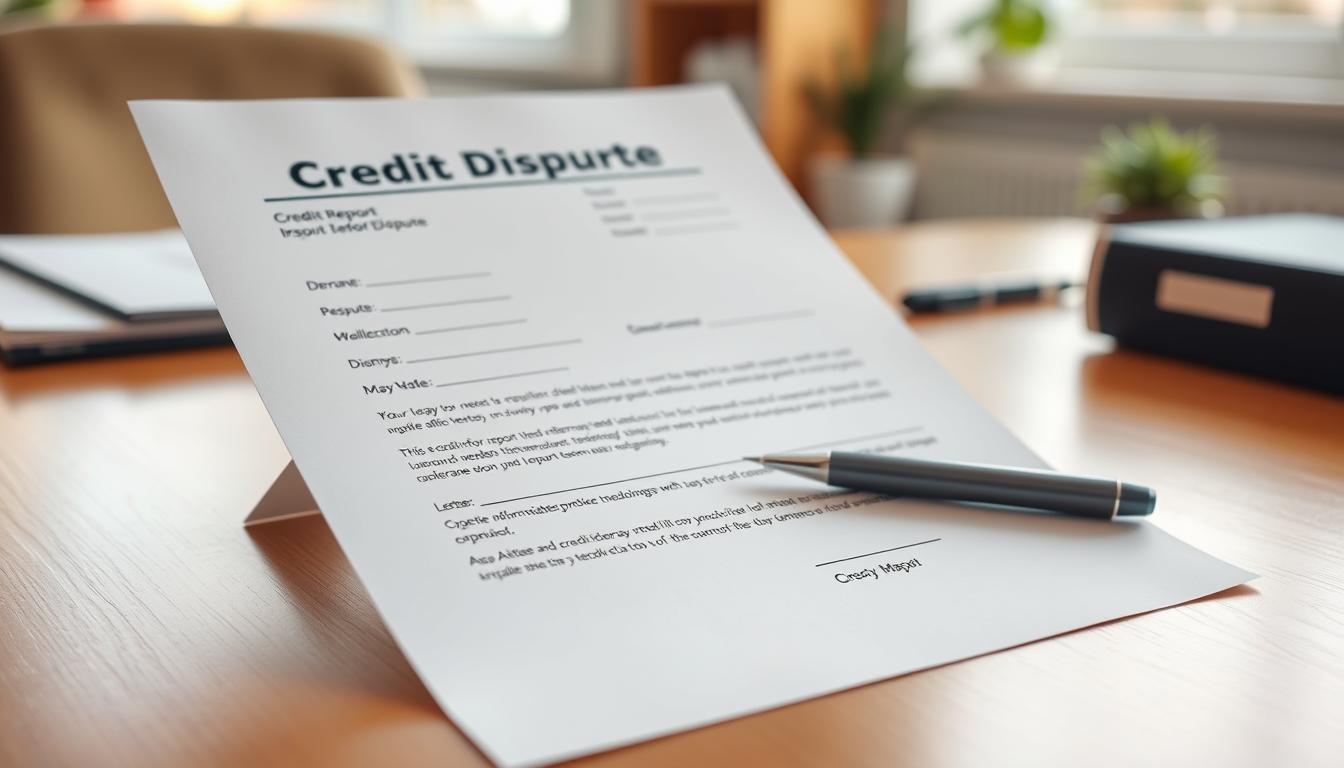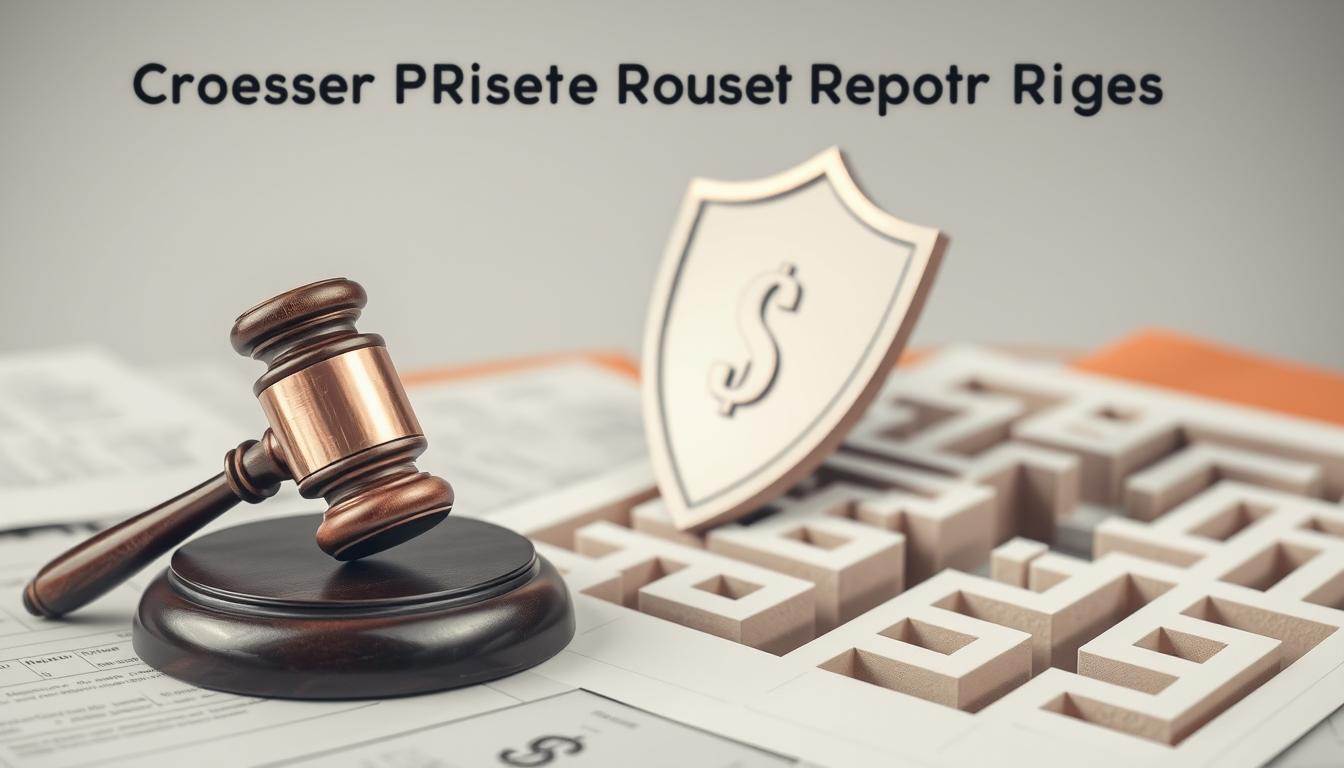Credit report disputes can be frustrating, but addressing them quickly is vital. This guide will help you remove disputes from your credit report. We’ll cover common reasons for disputes and how to prepare necessary documentation.
You’ll learn to communicate with credit bureaus and creditors effectively. This knowledge will help you regain control of your credit. It will also support your financial goals.
Key Takeaways
- Understand what constitutes a credit report dispute and the common reasons for disputes
- Gather the necessary documentation to support your dispute claim
- Learn the step-by-step process for filing a dispute with credit bureaus
- Effectively communicate with creditors to resolve credit report errors
- Follow up on the progress of your dispute to ensure a timely and accurate resolution
Understanding Credit Report Disputes
Credit report disputes help keep your credit history accurate. They address errors on your credit report. Knowing how disputes work is important for fixing mistakes.
What Constitutes a Dispute?
A credit report dispute asks a credit bureau to fix wrong information. This includes incorrect account details, fraud, or identity theft. You can dispute anything that seems inaccurate or unverifiable.
Common Reasons for Credit Report Disputes
Credit report disputes happen for several reasons. Here are some common ones:
- Inaccurate account information: This could involve incorrect details about the status of an account, such as its balance, payment history, or even the account owner.
- Fraudulent activity: If you suspect that someone has opened an account in your name without your knowledge or authorization, this would constitute a valid credit report dispute.
- Identity theft: When your personal information, such as your name, Social Security number, or address, has been used by someone else to open accounts or make purchases, it can result in a credit report dispute.
- Mistaken identity: In some cases, your credit report may contain information that belongs to someone else with a similar name or personal details.
Knowing about different types of disputes helps you fix credit report issues. It’s key to keeping your credit history accurate. Taking action quickly can protect your financial health.
Preparing to Dispute Credit Report Errors
Fixing credit report errors is crucial for a healthy financial profile. Proper preparation is key to a successful dispute. Gather the right documents and organize your case effectively.
Gather all relevant documentation to support your claim. This includes credit reports, billing statements, and payment receipts. Organize these papers carefully to make your dispute compelling.
- Obtain a copy of your credit report from each of the three major credit bureaus: Experian, Equifax, and TransUnion.
- Carefully review each report for any errors, discrepancies, or items that you believe are inaccurate.
- Collect any supporting documentation that can substantiate your claims, such as payment receipts or correspondence with creditors.
Organize your dispute information clearly and concisely. This shows attention to detail to credit bureaus. Create a system to track errors, evidence, and steps taken.
“The key to a successful credit report dispute is preparation and organization. By gathering the necessary documentation and structuring your case, you increase the chances of having the errors removed from your report.”
Learn about the credit dispute process and timelines. Understanding the steps and requirements will boost your confidence. It will also increase your chances of success.

Good preparation helps remove inaccuracies from your credit report. This effort maintains a strong, accurate financial profile. Take action today for a better financial future.
how do i remove a dispute from my credit report
Filing a Dispute with Credit Bureaus
Found an error on your credit report? Contact the credit bureaus directly. Reach out to Experian, Equifax, and TransUnion online, by mail, or phone. Give them detailed info about the dispute, along with supporting documents.
Providing Necessary Documentation
When disputing a credit report, submit proof to back your claim. Include copies of bills, statements, or records showing the error. Make sure all documents are clear and directly related to the dispute.
Here are some common types of documentation for credit report disputes:
- Copies of bills or statements showing the correct information
- Proof of identity, such as a driver’s license or passport
- Copies of correspondence with the creditor or debt collector
- Detailed explanation of the dispute and why the information is inaccurate
Strong documentation boosts your chances of resolving the dispute. It helps remove incorrect info from your credit report. This step is crucial for maintaining an accurate financial record.
Communicating with Creditors
Effective communication with creditors is vital for resolving credit report disputes. By communicating with creditors for credit report disputes, you can help them investigate and address issues. A well-written credit report dispute letter is crucial for this process.
Drafting a Dispute Letter
Include specific details about errors on your credit report when drafting a credit report dispute letter. Explain the problem clearly and provide supporting documents. Request a timely resolution and follow up if needed.
Here’s a sample credit report dispute letter to guide you:
Dear [Creditor Name],
I am writing to dispute the following item on my credit report:
- [Provide a brief description of the error or inaccuracy]
- [Include any relevant account numbers, dates, or other details]
I have enclosed copies of [list any supporting documentation] to support my dispute. I request that this item be investigated and corrected or removed from my credit report as soon as possible.
Please let me know the outcome of your investigation and the steps taken to resolve this issue. I look forward to your prompt response.
Sincerely,
[Your Name]
Clear communication is essential for resolving credit report disputes. A well-crafted dispute letter increases your chances of a positive outcome. Outline the problem clearly and provide solid evidence to support your case.

Following Up on Credit Report Disputes
Keep track of your credit report disputes to ensure quick resolution. Stay alert and follow up often to boost your chances of success.
Mark your calendar to check on your disputes regularly. Credit bureaus must respond within 30 to 45 days, as required by law.
Regularly checking in on the progress of your case can help you stay on top of the situation and identify any delays or issues that may arise.
- Contact the credit bureaus to inquire about the status of your dispute and request a written update.
- If the credit bureaus have not responded within the allotted timeframe, follow up with them to ensure your dispute is being properly addressed.
- Keep detailed records of all communications, including dates, contact information, and any resolutions or next steps provided by the credit bureaus.
If your dispute remains unresolved, you may need to take further action. Check the section on dealing with unresolved disputes for guidance.
Stay proactive and monitor your credit report disputes. This helps address errors quickly and keeps your credit report accurate.
Dealing with Unresolved Disputes
Unresolved credit report disputes can be frustrating. But don’t worry, there are steps to escalate and resolve them. This guide will show you how to take action and get results.
We’ll explore ways to escalate your dispute effectively. You’ll learn the next steps for unresolved credit report disputes. Our goal is to help you achieve the outcome you want.
Escalating Your Dispute
If your first dispute remains unresolved, it’s time to step things up. Here’s what you can do:
- Contact the credit bureau(s) again and request a status update on your dispute. Politely but firmly express your dissatisfaction with the lack of resolution and your desire to move the process forward.
- If the credit bureau remains unresponsive or unwilling to resolve the issue, consider filing a complaint with the Consumer Financial Protection Bureau (CFPB) or your state’s consumer protection agency. These organizations can investigate your case and intervene on your behalf.
- You may also want to reach out to the creditor(s) involved in the disputed item(s) and request their assistance in resolving the issue. They may be able to provide additional documentation or work directly with the credit bureau to correct the information.
- As a last resort, you can consider seeking legal assistance from a consumer rights attorney. They can help you navigate the complex credit reporting laws and potentially file a lawsuit against the credit bureau or creditor if necessary.
Persistence is crucial when escalating credit report disputes. Keep detailed records of all communications. This approach will help you resolve unresolved credit report disputes effectively.
By following these steps, you’ll improve your chances of success. You can ensure your credit report is accurate and up-to-date.

Preventing Future Credit Report Errors
Your credit report’s accuracy is vital for financial health. Manage your credit profile actively to avoid future credit report errors. This helps maintain your creditworthiness. Here are strategies to keep your credit report management on track:
- Regular Credit Report Monitoring: Make it a habit to review your credit report periodically, at least once a year. This allows you to identify and address any inaccuracies or discrepancies promptly.
- Prompt Dispute Resolution: If you encounter any errors or questionable items on your credit report, take swift action to dispute them with the appropriate credit bureaus. By maintaining accurate credit report, you can avoid potential issues down the line.
- Responsible Credit Management: Practice good credit habits, such as making timely payments, keeping credit card balances low, and limiting new credit applications. This proactive credit report management will help you maintain a healthy credit profile.
- Utilize Credit Monitoring Services: Consider enrolling in a credit monitoring service that can alert you to any changes or suspicious activity on your credit report, enabling you to address potential issues before they escalate.
These strategies help you stay ahead of potential issues. They ensure your credit profile accurately reflects your financial standing. Your creditworthiness remains protected with these proactive steps.
| Strategy | Benefits |
|---|---|
| Regular Credit Report Monitoring | Identify and address errors promptly |
| Prompt Dispute Resolution | Maintain accurate credit report |
| Responsible Credit Management | Proactive credit report management |
| Utilize Credit Monitoring Services | Stay informed about changes and address issues early |
Taking action on these strategies is crucial. It helps prevent future credit report errors effectively. Your credit profile stays healthy and accurate as a result.
“A good credit report is the foundation of financial stability and success. Protect it vigilantly.”
Understanding Your Rights
Your consumer rights are vital in credit report disputes. The Fair Credit Reporting Act (FCRA) and other laws protect you during this process. These laws ensure fair treatment and accurate credit reporting.
You can dispute any inaccurate, incomplete, or unverifiable information on your credit report. Credit bureaus must investigate your claims within a set timeframe. They must remove incorrect information if found.
You’re entitled to a free copy of your credit report after a successful dispute. This helps you verify the updated information’s accuracy. It ensures your credit report remains current.
During disputes, you can submit documentation to support your claim. This may include payment records or creditor correspondence. Such evidence strengthens your case for accurate reporting.
Knowing your rights during credit report disputes is crucial. It helps ensure fair treatment and accurate financial history reporting. Familiarize yourself with these rights for better credit protection.
“Knowing your rights is the first step in protecting your credit and financial well-being.”

Understanding consumer protection laws for credit report disputes empowers you. It helps you navigate the process confidently. You can address and correct errors promptly.
Working with Credit Repair Services
Credit repair services can be a valuable asset for credit report disputes. These professionals have expertise in removing errors from your credit report. They can advocate for you and guide you through the dispute process.
A reputable credit repair company ensures your rights are protected. They can help you navigate the complex world of credit disputes effectively.
Evaluating Credit Repair Companies
It’s crucial to research various credit repair companies before hiring one. Look for specific qualities to ensure you choose a reliable service.
Seek companies with a proven track record of successful disputes. Check for transparency in pricing and services. Look for positive reviews from past and current clients.
Ensure the company complies with all applicable laws and regulations. A dedicated team of specialists should handle your case.
- Proven track record of successful credit report disputes and improvements
- Transparency in their pricing, services, and client success stories
- Positive reviews and testimonials from past and current clients
- Compliance with all applicable laws and regulations
- A dedicated team of credit repair specialists to handle your case
| Credit Repair Company | Years in Business | Average Credit Score Increase | Customer Satisfaction Rating |
|---|---|---|---|
| Credit Pros | 15 | 40 points | 4.8/5 |
| Lexington Law | 20 | 35 points | 4.6/5 |
| Sky Blue Credit | 12 | 30 points | 4.5/5 |
Careful evaluation of credit repair companies helps you make an informed choice. Select a partner committed to improving your credit profile. Your decision can greatly impact your financial future.
Conclusion
We’ve explored how to remove disputes from your credit report. You now have the tools to control your credit profile. This guide covered dispute types, preparation, and communication with bureaus and creditors.
Key takeaways include spotting errors, gathering documents, and following up on disputes. Your credit health is in your hands. Addressing inaccuracies ensures a fair picture of your financial history.
Remember your consumer rights and available resources. Credit repair services can help with unresolved issues. Use these strategies to maintain your credit report’s integrity.
With the right approach, you can build a stronger financial future. Keep monitoring your credit and act promptly on any discrepancies.

